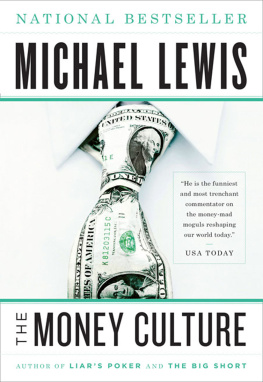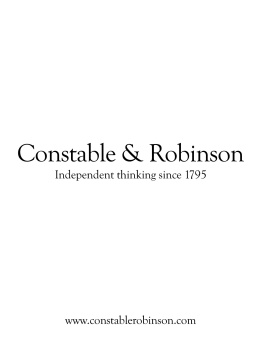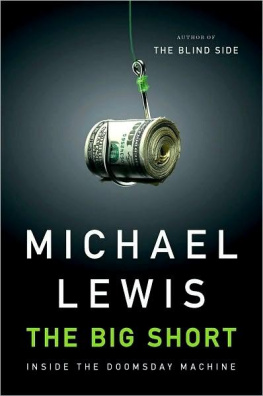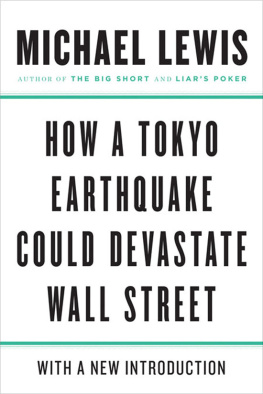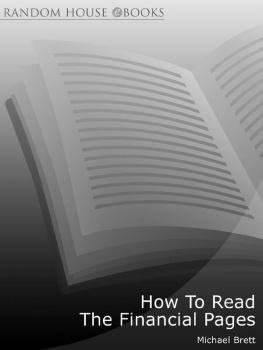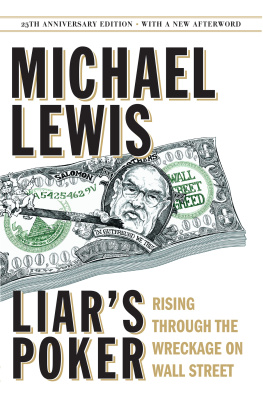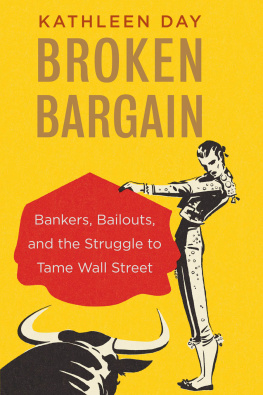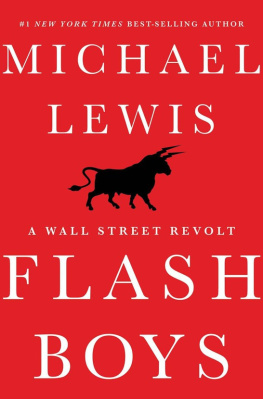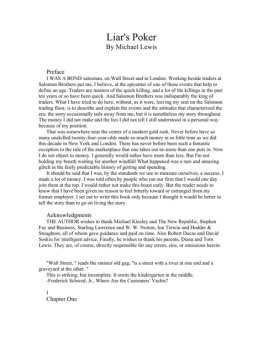The MONEY CULTURE
MICHAEL LEWIS
W W NORTON & COMPANY
New York London
Copyright 1991 by Michael Lewis
All rights reserved.
Excerpt from H. L. Mencken, Prejudices: Fourth Series ,
reprinted by permission of Enoch Pratt Free Library, Baltimore,
in accordance with the terms of the will of H. L. Mencken.
For information about permission to reporduce selections from this book,
write to Permissions, W. W. Norton & Company, Inc.,
500 Fifth Avenue, New York, NY 10110
Library of Congress Cataloging-in-Publication Data
Lewis, Michael (Michael M.).
The money culture / by Michael Lewis.
p. cm
1. Brokers. 2. Finance. I. Title.
HG4621.L48 1991
332.62dc20 91-13331
ISBN: 978-0-393-03037-2
W.W. Norton & Company, Inc.
500 Fifth Avenue, New York, N.Y. 10110
www.wwnorton.com
W. W. Norton & Company Ltd.
Castle House, 75/76 Wells Street, London W1T 3QT
This volume is affectionately dedicated to
the woman who taught me that there is more credit
in making the right enemies than in making the wrong friends:
my mother.
The iconoclast proves enough when he proves by his blasphemy that this or that idol is defectively convincingthat at least one visitor to the shrine is left full of doubts. The liberation of the human mind has been best furthered by gay fellows who heaved dead cats into sanctuaries and then went roistering down the highways of the world, proving to all men that doubt, after all, was safethat the god in the sanctuary was a fraud. One horse-laugh is worth ten thousand syllogisms.
H. L. M ENCKEN
Contents
THE MONEY CULTURE
Introduction
At the beginning of the last decade there was a kind of moral fad in parts of the United States that spread almost immediately to the capital cities of industrial Europe. The age old Anglo-European taboo of handling money was shoved offstage by the sheer force of events in the financial world, clearing the way for a new money culture.
The change most obviously affected the behavior of the well-to-do. The fortunate offspring of the ancienne noblesse, who would have been expected to enter the quiet professions or perhaps a genteel family business, went into predatory trade. Heirs to old New England fortunes raised so far from financial reality that they could hardly balance their checkbooks suddenly wanted to stage hostile raids on Americas corporations for the greater glory of Goldman Sachs. Of course, it wasnt only the rich who wanted to experiment with financial terrorism. The rich were just the tracer dye in the water, the clearest evidence of cultural drift.
All those young studs with gleams in their eyes who streamed from Harvard and Stanford onto Wall Street are said to have been greedy. I dont believe this for a minute. Greed for moneyfor the sake of money alone, rather than its attendant statusrequires years of practice to learn. It is a rare trait in young people, especially in those who have never tasted deprivation. The money was important, but mainly as a way of keeping score. The appeal of the new financial world to a young person was its promise of drama. For a brief moment there was this corner in the world economy that didnt require you to grow up the way American businessmen usually grow up. You didnt have to be Babbitt. You didnt have to submit to the Establishment.
On the contrary, many of the trendsetters in the new money culture had antiestablishment credentials; that counterculture gurus such as Jerry Rubin drifted in the 1980s onto Wall Street was no accident. Bruce Wasserstein, the patron saint of the hostile takeover, had worked for Ralph Nader. Michael Milken, who created the market for junk bonds, left Wall Street for California, where he built an empire in the spirit of bohemia upon the foolishness of Establishment bankers and captains of industry. He said that finance was an art forman art form! Lewie Ranieri, who created the market for mortgage bonds, had to be ordered by his chief executive officer to buy himself proper business suits (I hate these suits, he told me). You had only to spend about five minutes with these people to realize they didnt see themselves as part of orthodox business culture. They saw themselves romantically, as guerillas in the corporate jungle. They were fanatics with attitudes.
Their style of business travelled much better than they did themselves. By 1984 any city with a financial district was swarming with versions of the American idea of success. Paris had its golden boys; London had its yuppies. Young Italians, Germans, Swedes, and Swiss poured into London looking for work in the European branch offices of American investment banks. From Tokyo there was token resistancethe elite graduates of Tokyo University were slow to forego the safety and discomfort of Japanese corporations for the high drama of American investment banks. But they did. And before long a style of capitalism had become one of Americas leading cultural exports. It had all begun with seemingly dry and boring changes in technology, financial regulation, and levels of debt in America, but it ended with a revolution in everyday commercial behavior.
The pieces collected in this book are set mainly in and around the new money culture. They all relate, in one way or another, to the marvelous commercial madness of the 1980s. Ive ordered them geographically, with a section each on America, Europe, and Japan. I wont pretend they were written with the intention of herding them between hardcovers; but I dont intend to apologize for them either. After all, this is how I make my living these days.
In 1985, the average income of the ten best paid people on Wall Street rose from $29 million to $51 million, and everyone involved traded in his gold American Express card for platinum. One night early that year, Stephen Joseph, a partner of the now bankrupt Drexel Burnham made what seemed to be a routine business trip to Minnesota. The only unusual thing about it was that he visited his client in his home and stayed late for drinks. In the course of the evening Joseph happened to mention how much he expected to be paid. The number made an impression on the clients seven-year-old-son, who was eavesdropping on the staircase. Two days later the boy handed his father an essay he had prepared for school. It was called What I Want to Be When I Grow Up and almost perfectly captured the mood of the day.
I want to be an investment banker. If you had 10,000 sheres [sic] I sell them for you. I make a lot of money. I will like my job very, very much. I will help people. I will be a millionaire. I will have a big house. It will be fun for me.
While those words were being written, I was interviewing for jobs on Wall Street. I eventually landed at Salomon Brothers, where I occasionally helped people, but more often helped myself. In my spare time I wrote. Several of the pieces included here were written in the evenings, after a day spent in a training program in New York or on a trading floor in London. A daytime job was an enormous and perhaps unfair advantage for a writer. It enabled me to watch people when they didnt know they were being watched and disabused me of any illusions I might have had about Wall Street or its leaders, who were my bosses. In my defense I can only say that my bosses knew what I was doing all along; one even took it upon himself to read my pieces before they appeared in print.

